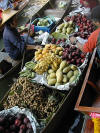|
talaat nahm (ตลาดน้ำ)
Thai. ‘Water market’. A floating market where
people trade from boats. These
markets have a rich
history dating back to the
Ayutthaya and early
Rattanakosin
periods,
when canals connected communities and merchants navigated boats
laden with produce, seafood, and goods. Floating markets were not
just centers of commerce but also lively social hubs. With the
expansion of road networks in the 20th century, floating markets saw
a decline in significance, and many faded from prominence.
However, although
these markets are no longer the commercial hubs they once were, they
have in recent decades experienced a revival, now primarily serving
as cultural and tourist attractions. While some still cater to local
populations, many offer visitors a nostalgic glimpse into Thailand's
riverine heritage, showcasing traditional wooden boats filled with
tropical fruits, grilled seafood, coconut pancakes, and
guay tiyaw
reua (fig.),
literally ‘boat rice noodles’, an original dish that has it
roots in this waterborne commerce.
Floating markets are
still found throughout the country and
on the Bangkok canals, such as
Talaat Nahm Khwan-Riam,
i.e. Khwan-Riam Floating Market (fig.),
on
Khlong Saen Saeb.
The floating market most
visited
by foreign tourists is
Damnoen Saduak in the province
Ratchaburi (map
-
fig.).
Less touristy are the floating markets
of Sai Noi in
Nonthaburi; Bang Phli
in
Samut Prakan,
which besides a floating market is also home to
Wat Bang
Phli Yai Nai
(map
-
fig.), a temple related to the
Legend of the Five Floating Buddha Statues;
and those in
Samut Songkhram,
including the daily talaat nahm ‘Amphawa’
(fig.), and the talaat nahm
‘Tha Kha’ and talaat nahm ‘Bang Noi’, which open only a few times per
month, on dates determined by the traditional lunar calendar.
The
Ayodhaya
Floating Market or Talaat Nahm Ayodhaya (ตลาดน้ำอโยธยา)
in
Ayutthaya
(map
-
fig.)
is visited by mostly Thai tourists and on a regular basis the
organizers put on a
cultural show, both on land and in boats, featuring historical
events from the Ayutthaya Period, with actors dressed as warriors (fig.). Floating markets were promoted during the campaign for the 1971 Visit
ASEAN
Year, which
resulted in the publication of a postage stamp (fig.)
in that year, and are also regularly promoted during certain events
or in shopping malls (vdo). Also
talaat thong nahm.
See THEMATIC STREET LIGHT (1),
(2)
and
(3),
WATCH VIDEO (1),
(2)
and
(3),
VIDEO (M1)
and
(M2), and
VIDEO (EN1)
and
(EN2).
回






|

